- Home
- About
- Map
- Trips
- Bringing Boat West
- Migration West
- Solo Motorcycle Ride
- Final Family XC Trip
- Colorado Rockies
- Graduates' XC Trip
- Yosemite & Nevada
- Colorado & Utah
- Best of Utah
- Southern Loop
- Pacific Northwest
- Northern Loop
- Los Angeles to NYC
- East Coast Trips
- Martha's Vineyard
- 1 Week in Quebec
- Southeast Coast
- NH Backpacking
- Martha's Vineyard
- Canadian Maritimes
- Ocracoke Island
- Edisto Island
- First Landing '02
- Hunting Island '02
- Stowe in Winter
- Hunting Island '01
- Lake Placid
- Chesapeake
- Provincetown
- Hunting Island '00
- Acadia in Winter
- Boston Suburbs
- Niagara Falls
- First Landing '99
- Cape Hatteras
- West Coast Trips
- Burning Man
- Utah Off-Roading
- Maui
- Mojave 4WD Course
- Colorado River Rafting
- Bishop & Death Valley
- Kauai
- Yosemite Fall
- Utah Off-Road
- Lost Coast
- Yosemite Valley
- Arizona and New Mexico
- Pescadero & Capitola
- Bishop & Death Valley
- San Diego, Anza Borrego, Joshua Tree
- Carmel
- Death Valley in Fall
- Yosemite in the Fall
- Pacific Northwest
- Utah Off-Roading
- Southern CA Deserts
- Yosemite & Covid
- Lake Powell Covid
- Eastern Sierra & Covid
- Bishop & Death Valley
- Central & SE Oregon
- Mojave Road
- Eastern Sierra
- Trinity Alps
- Tuolumne Meadows
- Lake Powell Boating
- Eastern Sierra
- Yosemite Winter
- Hawaii
- 4WD Eastern Sierra
- 4WD Death Valley +
- Southern CA Deserts
- Christmas in Tahoe
- Yosemite & Pinnacles
- Totality
- Yosemite & Sierra
- Yosemite Christmas
- Yosemite, San Diego
- Yosemite & North CA
- Seattle to Sierra
- Southwest Deserts
- Yosemite & Sierra
- Pacific Northwest
- Yosemite & South CA
- Pacific Northwest
- Northern California
- Southern Alaska
- Vancouver Island
- International Trips
- Index
- Tips
- Books
- Photos/Videos
- Search
- Contact
San Simeon State Park and Hearst Castle, CA
Monday, December 2, 2013 - 11:15am by Lolo
239 miles and 5 hours from our last stop - 1 night stay
Travelogue
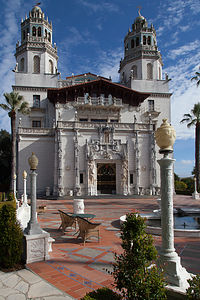 Hearst CastleNow that the boys were back to work after our wonderful Thanksgiving together in Yosemite, Herb and I were on own to explore the southern coast of California. With 9 days ahead of us before our flight back to New Jersey, we figured we would mosey on down to San Diego, making stops at interesting places along the way.
Hearst CastleNow that the boys were back to work after our wonderful Thanksgiving together in Yosemite, Herb and I were on own to explore the southern coast of California. With 9 days ahead of us before our flight back to New Jersey, we figured we would mosey on down to San Diego, making stops at interesting places along the way.
I had always wanted to see Hearst Castle, so that was first on our list. A quick consultation of our West Coast RV Camping Bible pointed us towards San Simeon State Park, just 5 miles south of Hearst Castle.
As much as I would have loved to see Monterey and Carmel again, we decided to drive down US 101 rather than Route 1 from Pacifica to San Simeon, as that section of Route 1 is a little nerve-racking in an RV. Besides, we would be back to the Bay Area so many times in the future now that Andrew lives in San Francisco that we could save that for a future trip when we could do it by car.
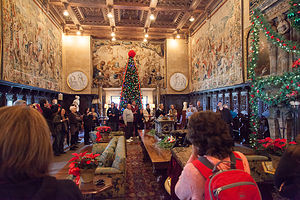 Hearst Castle Great RoomSan Simeon State Park was a great find, not just because of its proximity to the Castle, but because it was beautiful in its own right. There are two campgrounds to choose from in the park – one just across the road from the beach that has showers and costs $35 a night, and the Washburn Primitive Campground, a mile further inland on the top of a plateau overlooking the ocean and the Santa Lucia Mountains, with no showers for $20 a night. We chose Washburn, not for the $15 savings, but because of the views, and the fact that there was a trail to run on right from the campground to the beach.
Hearst Castle Great RoomSan Simeon State Park was a great find, not just because of its proximity to the Castle, but because it was beautiful in its own right. There are two campgrounds to choose from in the park – one just across the road from the beach that has showers and costs $35 a night, and the Washburn Primitive Campground, a mile further inland on the top of a plateau overlooking the ocean and the Santa Lucia Mountains, with no showers for $20 a night. We chose Washburn, not for the $15 savings, but because of the views, and the fact that there was a trail to run on right from the campground to the beach.
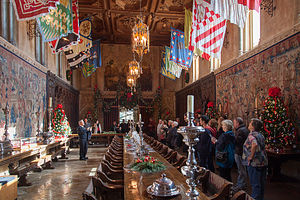 Hearst Castle Dining RoomWith the days so short this time of year, we really had to get all outdoor activities in my 4:30 or 5:00, which was really pretty annoying. So, we quickly got on our running clothes and headed out on the San Simeon Creek Trail, which led us from our nice Monterey pine covered ridge down a steep trail along the creek to a boardwalk across a wetland and out to the beach. Once on the beach, we ran south for awhile before making the steep climb back through the forest. We arrived back at our campsite just in time to watch the sun dip behind the mountains.
Hearst Castle Dining RoomWith the days so short this time of year, we really had to get all outdoor activities in my 4:30 or 5:00, which was really pretty annoying. So, we quickly got on our running clothes and headed out on the San Simeon Creek Trail, which led us from our nice Monterey pine covered ridge down a steep trail along the creek to a boardwalk across a wetland and out to the beach. Once on the beach, we ran south for awhile before making the steep climb back through the forest. We arrived back at our campsite just in time to watch the sun dip behind the mountains.
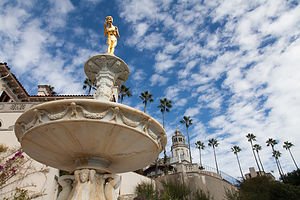 Hearst Castle Gold Girl in FountainThe next morning we were off to Hearst Castle for our 10:00 tour, which we had booked online the previous day – a smart thing to do because of the extreme popularity of these tours, which often book up days in advance. There are three different tours offered: the Grand Rooms, the Upstairs Suites, and the Cottages and Kitchens. We chose the Grand Rooms, the one recommended for first time visitors. However, we did notice that several of our fellow tourists had booked multiple tours, which wasn’t a bad idea. There’s also an Evening Tour where docents dress up in period costumes and make you feel that you are a guest at the castle. That one sounded really cool, but Herb wanted to photograph the Castle during the day – perhaps, next time.
Hearst Castle Gold Girl in FountainThe next morning we were off to Hearst Castle for our 10:00 tour, which we had booked online the previous day – a smart thing to do because of the extreme popularity of these tours, which often book up days in advance. There are three different tours offered: the Grand Rooms, the Upstairs Suites, and the Cottages and Kitchens. We chose the Grand Rooms, the one recommended for first time visitors. However, we did notice that several of our fellow tourists had booked multiple tours, which wasn’t a bad idea. There’s also an Evening Tour where docents dress up in period costumes and make you feel that you are a guest at the castle. That one sounded really cool, but Herb wanted to photograph the Castle during the day – perhaps, next time.
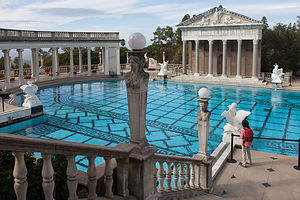 Hearst Castle Neptune Pool EntranceWe had about a ½ to kill before our tour, so we explored the very informative exhibits in the Visitor Center where we learned a great deal about the man himself, William Randolph Hearst, as well as about the history of his castle. Good, I felt prepped for my tour.
Hearst Castle Neptune Pool EntranceWe had about a ½ to kill before our tour, so we explored the very informative exhibits in the Visitor Center where we learned a great deal about the man himself, William Randolph Hearst, as well as about the history of his castle. Good, I felt prepped for my tour.
Without giving everything away, the following is a very brief summary of its history:
Back in 1865, William Randolph Hearst’s father George purchased 40,000 acres of ranchland in San Simeon, which eventually grew to 250,000 acres by the time of his death in 1919. William, a wealthy man in his own right from his vast publishing empire, inherited the land and immediately began dreaming of transforming it into a retreat. For its location, he chose the solitary top of a hill, which he named la Cuesta Encantada, the Enchanted Hill. For 30 years and $25 million, Hearst and his architect Julia Morgan worked on designing what you see today – the 115-room, Mediterranean Revival style Castle and its surrounding 127 acres of gardens, terraces, pools, and walkways. Plus, three guest "cottages." The design also incorporated his extensive art collection, much of which is on display both in the mansion as well as in the surrounding gardens and terraces. During the 1920s and 1930s, this opulent estate became a gathering place for many Hollywood and political elites, such as Cary Grant, James Stewart, Bob Hope, Charlie Chaplin, the Marx Brothers, Franklin Roosevelt, Calvin Coolidge, Winston Churchill, and more. In 1957, the Hearst family donated the estate to the state of California, and that is why we are fortunate enough to be one of Hearst’s guests today.
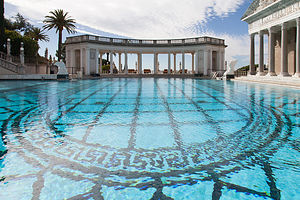 Hearst Castle Neptune PoolOkay, now that we are all up to speed somewhat, it’s time to join the bus for an incredible five-mile steep and windy journey up to the Castle atop the Enchanted Hill. As far as I was concerned, this ride was already worth my $25 price of admission. The views of the castle, the San Lucia Mountains, and the Pacific Ocean were breathtaking. An audio narration by Alex Trebek added to the trip as well.
Hearst Castle Neptune PoolOkay, now that we are all up to speed somewhat, it’s time to join the bus for an incredible five-mile steep and windy journey up to the Castle atop the Enchanted Hill. As far as I was concerned, this ride was already worth my $25 price of admission. The views of the castle, the San Lucia Mountains, and the Pacific Ocean were breathtaking. An audio narration by Alex Trebek added to the trip as well.
Once atop the hill, we were greeted by our docent who would for the next 45 minutes lead us through various parts of the castle and estate, which in this tour included the Assembly Room, Refectory, Billiard Room, Theater, Gardens, Neptune Pool, and Roman Pool. Our docent was great and it seemed that his family had had some connection with William Randolph Hearst.
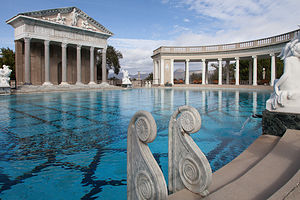 Hearst Castle Neptune PoolI absolutely love mansion tours, mostly because I like to peek into other people’s lives, especially when they are as interesting as William Randolph Hearst. The guided tour lasted 45 minutes, and then we were left to explore the estate on our own, which was probably the best part.
Hearst Castle Neptune PoolI absolutely love mansion tours, mostly because I like to peek into other people’s lives, especially when they are as interesting as William Randolph Hearst. The guided tour lasted 45 minutes, and then we were left to explore the estate on our own, which was probably the best part.
Besides the castle itself, the estate also includes three “cottages” connected by a series of terraces and walkways. Everything is relative. One man’s cottage is another man’s mansion, because these were beautiful. Each of them was named based on their view. The one facing the sea, and the largest of the group, was called Casa del Mar. The Casa del Monte faced the Santa Lucia Mountains and the Casa del Sol appropriately faced the sunset.
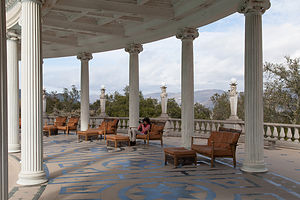 Lolo at Hearst Castle Neptune PoolProbably my highlight was the Neptune Pool. This is probably the most photographed part of the estate, and it’s easy to see why. Not only was the Greco-Roman themed pool beautiful, but the expansive views out over the mountains and ocean from its terrace were breathtaking as well. What decadence! There was even a replica of an ancient Roman temple.
Lolo at Hearst Castle Neptune PoolProbably my highlight was the Neptune Pool. This is probably the most photographed part of the estate, and it’s easy to see why. Not only was the Greco-Roman themed pool beautiful, but the expansive views out over the mountains and ocean from its terrace were breathtaking as well. What decadence! There was even a replica of an ancient Roman temple.
For those cooler days, Hearst also had an indoor pool for his guests to enjoy, modeled after the Baths of Caracalla in ancient Rome. Everyone should have one. Before seeing this, I never would have believed that an indoor pool could be so beautiful – it’s amazing what a little money can do; it’s even more amazing what a lot of money can do.
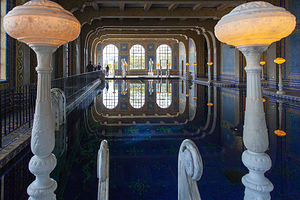 Hearst Castle Indoor PoolThe whole effect of the design was stunning. Blue and orange glass mosaic tiles covered the walls and arches, creating a shimmering effect in the water. The roof and dome were a mosaic of night blue, with the appropriate scattering of stars, making you feel that you were looking up at a clear night sky rather than sniffing chlorine around an indoor pool in the middle of the day. To complete the effect, blue and orange alabaster-carved globe lamps emitted a glow, creating the illusion of moonlight. It really was incredible.
Hearst Castle Indoor PoolThe whole effect of the design was stunning. Blue and orange glass mosaic tiles covered the walls and arches, creating a shimmering effect in the water. The roof and dome were a mosaic of night blue, with the appropriate scattering of stars, making you feel that you were looking up at a clear night sky rather than sniffing chlorine around an indoor pool in the middle of the day. To complete the effect, blue and orange alabaster-carved globe lamps emitted a glow, creating the illusion of moonlight. It really was incredible.
One of the tour guides standing around the pool told us that on one really, really hot day, after all the tours were complete, they were allowed to jump in this pool to cool off. Now that would have been something.
Having seen all we were able to see of this incredible estate, we joined Alex Trebek for the bus ride back down the mountain.
Description
San Simeon State Park
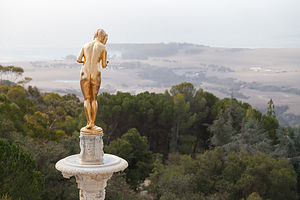 Hearst Castle OverlookSan Simeon State Park is located 35 miles north of San Luis Obispo along scenic Highway 1. Its 541 acres encompass two miles of rocky coastline, a Monterey pine forest, three natural preserves, and two campgrounds. The views inland of the Santa Lucia Mountains are spectacular. The 3.3 mile San Simeon Creek trail runs through the park from the Washburn campground, along the creek, and down to and along the beach.
Hearst Castle OverlookSan Simeon State Park is located 35 miles north of San Luis Obispo along scenic Highway 1. Its 541 acres encompass two miles of rocky coastline, a Monterey pine forest, three natural preserves, and two campgrounds. The views inland of the Santa Lucia Mountains are spectacular. The 3.3 mile San Simeon Creek trail runs through the park from the Washburn campground, along the creek, and down to and along the beach.
The park has two campgrounds set across the highway from the beach. San Simeon Creek Campground has 134 sites and the Washburn Primitive Campground has 70 sites. The Washburn Campground is located approximately one mile inland from the beach on a plateau overlooking the Santa Lucia Mountains and the ocean.
The Park’s major draw is its proximity to Hearst Castle, just 5 miles north of the campground.
Hearst Castle
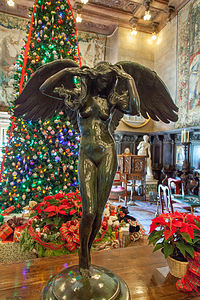 Hearst Castle at ChristmasHearst Castle is the famous 165-room estate of publishing magnate William Randolph Hearst. This magnificent “castle” sits in solitary splendor atop a hill, which Hearst named la Cuesta Encantada, the Enchanted Hill.
Hearst Castle at ChristmasHearst Castle is the famous 165-room estate of publishing magnate William Randolph Hearst. This magnificent “castle” sits in solitary splendor atop a hill, which Hearst named la Cuesta Encantada, the Enchanted Hill.
Its history began in 1865, when Hearst’s father, George Hearst, purchased 40,000 acres of ranchland. By the time of George’s death in 1919, the ranch had grown to 250,000 acres, all of which were inherited by his son William, who immediately began dreaming of ways to transform it into a retreat. For almost 30 years and $10 million, Hearst and his architect Julia Morgan, worked to create the Castle itself and 127 acres of gardens, terraces, pools, and walkways.
Hearst was very much personally involved in the estate’s design, which is a blend of Italian, Spanish, and Moorish styles. His legendary art collection, which rivals many museums, is on display both in the mansion, as well as in the gardens and terraces surrounding it.
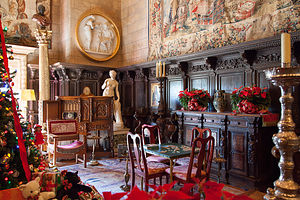 Hearst Castle Great Room DetailThe estate also includes three opulent guest houses, each focusing on a different view. Casa del Mar, the largest of the three, faces the sea, Casa del Monte looks out over the Santa Lucia Mountains, and Casa del Sol faces the sunset. The three “cottages” are connected by terraces and staircases and surrounded by gardens and sculptures.
Hearst Castle Great Room DetailThe estate also includes three opulent guest houses, each focusing on a different view. Casa del Mar, the largest of the three, faces the sea, Casa del Monte looks out over the Santa Lucia Mountains, and Casa del Sol faces the sunset. The three “cottages” are connected by terraces and staircases and surrounded by gardens and sculptures.
A highlight of the estate is the outdoor Greco-Roman Neptune Pool, perched at the edge of the hilltop, with expansive views of the mountains and sea. The pool patio features an ancient Roman temple supported by ancient Roman columns dating from the 1st to 4th century. Marble statues of Nymphs and Swans surround the pool.
There is also an indoor pool, styled after an ancient Roman bath, surrounded by eight Carrara-marble statues of Roman gods, goddesses, and heroes. The entire room is decorated with glass mosaic tiles of blue, orange, and clear fused with gold inside, creating a shimmering effect. The roof and dome are covered with mosaics of night blue, powdered with stars, while blue and orange-colored Alabaster globe lamps create the illusion of moonlight. The whole effect is breathtaking.
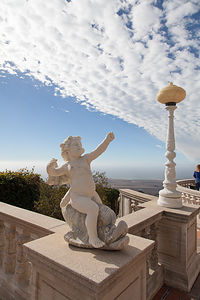 Hearst Castle CupidWith its beautiful art work, gardens, terraces, and pools, it is no wonder that an invitation to visit the Castle was highly coveted. In its heyday during the 1920s and 1930s, the Castle was the playground of many Hollywood and political elites, such as Cary Grant, James Stewart, Bob Hope, Charlie Chaplin, the Marx Brothers, Franklin Roosevelt, Calvin Coolidge, Winston Churchill, and more.
Hearst Castle CupidWith its beautiful art work, gardens, terraces, and pools, it is no wonder that an invitation to visit the Castle was highly coveted. In its heyday during the 1920s and 1930s, the Castle was the playground of many Hollywood and political elites, such as Cary Grant, James Stewart, Bob Hope, Charlie Chaplin, the Marx Brothers, Franklin Roosevelt, Calvin Coolidge, Winston Churchill, and more.
William Randolph Hearst and his Castle were also the inspiration for the 1941 movie Citizen Kane, which painted a rather unflattering picture of William Randolph Hearst. The mansion in the movie was called “Xanadu.”
In 1957, the Hearst family donated the estate to the state of California. As part of the California State Park system, it is open to the public for tours. Ticket reservations are recommended.
There are three different tours offered: Grand Rooms, Upstairs Suites, and Cottages and Kitchen. In the spring and fall, a longer Evening Tour, where docents in period costume portray Hearst’s guests, is also offered.
Tours begin at the visitor center at the foot of Enchantment Hill, where visitors can watch a 40-minute film about William Randolph Hearst’s life before riding the bus up the steep, zigzagging road to the Castle. Tours take about 2 hours, including time at the end to explore the castle grounds.
- ‹ previous
- 5 of 13
- next ›
San Simeon State Park and Hearst Castle location map in "high definition"
Javascript is required to view this map.
